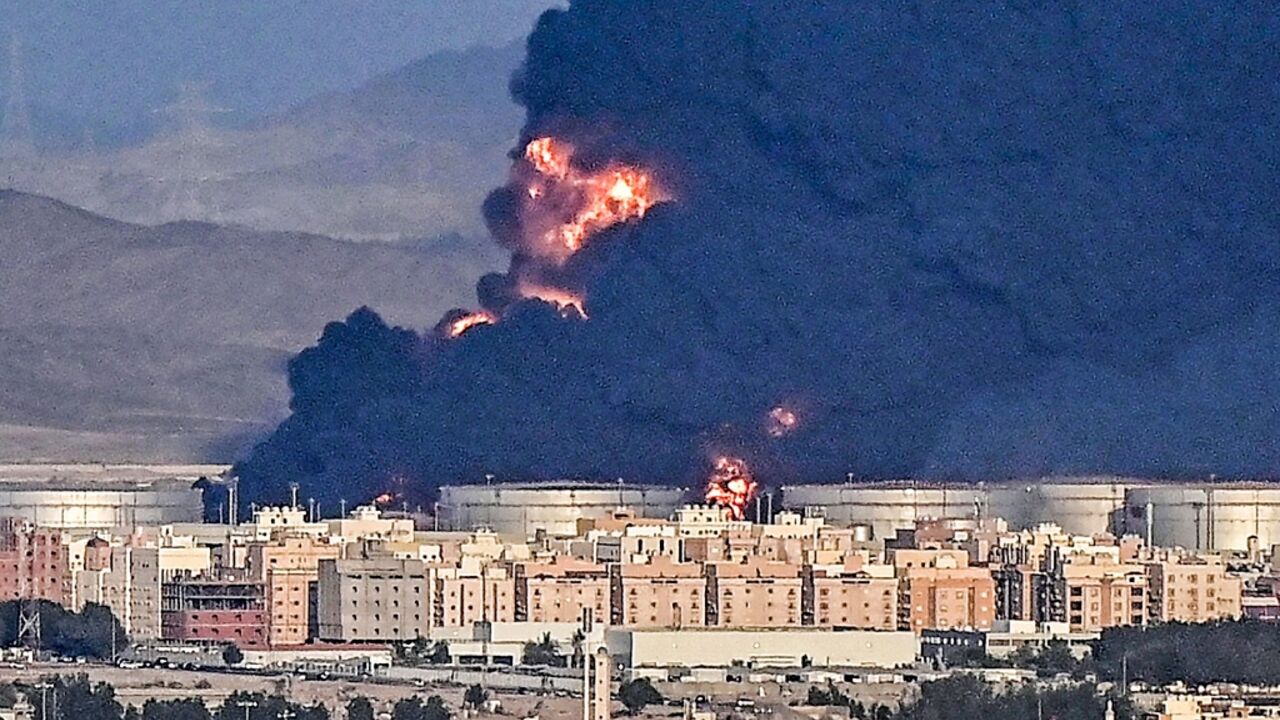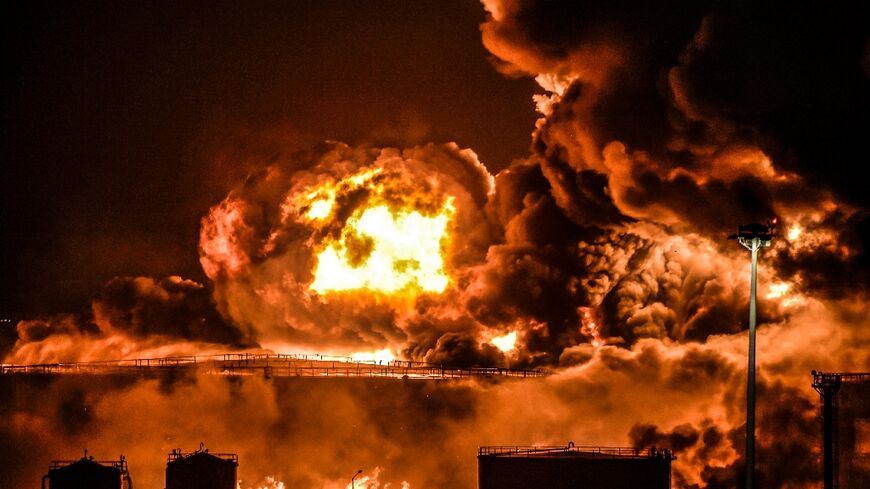Yemen rebels attack oil facilities near Saudi F1 track

A Yemeni rebel attack on a Saudi oil plant set off a huge fire near Jeddah's Formula One circuit during televised practice sessions on Friday, part of a wave of assaults on Aramco facilities.
Smoke billowed near the circuit and the second practice was delayed in the attack, one of 16 drone-and-missile attacks by the Iran-backed rebels around the kingdom.
The wave of assaults comes ahead of the seventh anniversary of a Saudi-led coalition's military intervention against the rebels in Yemen, a country in the grip of a major humanitarian crisis.
Oil prices have soared since Russia's invasion of Ukraine sparked supply fears, prompting Western powers to implore Saudi Arabia and other members of the OPEC cartel to ramp up production.
Friday's attacks targeted "Aramco facilities in Jeddah and vital facilities in the capital of the Saudi enemy, Riyadh", tweeted Huthi military spokesman Yahya Saree.
The Saudi-led coalition fighting the Iran-backed rebels confirmed the Jeddah attack.
The rebels have frequently launched similar assaults on Saudi oil facilities but the Jeddah attack came as a worldwide audience tuned in for the F1 Grand Prix.
World champion Max Verstappen was one of the first drivers to be aware of the drama unfolding.
"I can smell burning... is it my car?" Verstappen said over the team radio during the first practice session.
Coalition spokesman Turki al-Maliki said the fire had been brought under control and would not have an impact "on activities in Jeddah".
F1 boss Stefano Domenicali has insisted the race weekend will go ahead as planned.
Drivers, team bosses and Domenicali had four hours of meetings which ended early Saturday without an official announcement.
Mexican Red Bull driver Sergio Perez however said he was ready for the qualifying session.
"Ready and totally focused for tomorrow's qualy!" Perez tweeted after the meetings ended at 2:20 am, apparently confirming the decision to race on Sunday.
A F1 spokesperson earlier gave assurances that "the event can continue as planned" as the delayed second practice session got underway.
- Retaliatory strikes -
The attacks were launched from Sanaa, the rebel-held Yemeni capital, and Hodeida.
In response, the coalition launched air strikes "against sources of threat in Sanaa and Hodeida" early Saturday.
"The military operation will continue until its objectives are achieved," the coalition said in a statement quoted by the official Saudi news agency SPA.
The US State Department condemned the rebel attacks, calling them "unacceptable".
"We will continue to work with our Saudi partners to strengthen their defences while also working to advance a durable resolution that ends the conflict in Yemen," said State Department spokeswoman Jalina Porter.
The rebel attacks also hit an electrical station and a water facility in Jizan province, which borders Yemen.
- 'Direct threat' to oil supplies -
Saudi Arabia, one of the world's biggest oil exporters, warned on Monday that the attacks posed a "direct threat" to global supplies.
The kingdom "will not incur any responsibility" for shortages in oil supplies in light of the Iran-backed Huthi attacks, the foreign ministry said.
The statement on Monday came after the kingdom acknowledged a temporary drop in production after the Huthis attacked a refinery with an armed drone.
A Saudi energy ministry official reiterated the warning, saying Huthi attacks could affect the country's "production capacity and its ability to fulfil its obligations to global markets".
"They (rebels) are trying to impact the nerve-centre of the world economy," the coalition said in a statement.
The Saudi-led coalition intervened to support Yemen's internationally recognised government in 2015, after the rebels seized the capital Sanaa the previous year.
The war has killed hundreds of thousands directly or indirectly and left millions on the brink of famine in what the UN calls the world's worst humanitarian catastrophe.
Formula One is one of a number of high-profile events brought to Saudi Arabia in recent years, drawing accusations of "sportswashing" -- using sports events to distract from criticism of the country's human rights record.
Saudi Arabia executed 81 people on a single day earlier this month, prompting condemnation from human rights activists who questioned whether the prisoners received a fair trial.
The executions came just days before a visit by British Prime Minister Boris Johnson, who failed to secure any Saudi promises to pump more oil to help stabilise oil markets.
Johnson, who met the 36-year-old de facto ruler, Crown Prince Mohammed bin Salman, became one of the few Western leaders to visit Saudi Arabia since the 2018 murder of journalist Jamal Khashoggi at the Saudi consulate in Istanbul.
"I fully condemn the latest Huthi attack against critical sites in Saudi Arabia, including in Jeddah," the British leader tweeted on Friday.
"These strikes put civilian lives at risk and must stop."







